
Doors may finally be opening for female directors. Despite the pathetic percentage of women directing projects for the studios and networks – an issue currently being challenged by the ACLU through various government agencies – the number of female-directed projects selected to screen at major film festivals has been approaching parity with their male counterparts.
At this year’s Los Angeles Film Festival (LAFF) – held June 10-18 at the Regal Cinema, L.A. Live Downtown – 40% of the features in competition were directed by women. Stories were as varied as a contemporary crime thriller, a romantic comedy in an exotic location, a black comedy about ageism, and dramas that dealt with family secrets, sexual abuse and more. And the representation of women in independent film has not just been limited to mere inclusion in the festivals. Female-directed projects are winning awards on par with men.
“Filmmaking is a daunting challenge whether the director is a woman or not,” noted Kaitlin McLaughlin, co-director of Pocha (Manifest Destiny), which won the audience award for best fiction and a special mention jury award for directing.
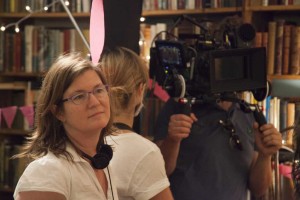
McLaughlin, who also wrote the screenplay, collaborated with director/ cinematographer Michael Dwyer on the script idea, which was sparked by an experience he had at the U.S./Mexican border. Together, they have brought to the screen a modern-day crime thriller about a young woman who has lived most of her life in California when she is deported to Mexico where she faces the moral dilemma of reconciling with her estranged father or partnering with a local smuggler to get back into the U.S.
Although men direct stories with female protagonists, when a woman deals with stories focused on women, those films get classified as a “chick flick,” another way of saying the film is not commercial, despite a potential audience of over 50% of the population.
“Any independent film that has a serious subject matter and is about women’s issues is more likely to have a woman director, but that’s what probably makes it hard,” commented Marya Cohn, first-time director and writer of The Girl in the Book, a well-written and enacted story about a young literary editor (Emily VanCamp, Captain America) with writers’ block, who must resolve the affects of an early sexual experience with an older mentor (Michael Nyqvist, The Girl with the Dragon Tattoo) in order to stop a pattern of destructive behavior and reclaim her creative voice.

The kernel of the story came from an incident that happened to Cohn that was similar to the relationship in the character’s past. “I really built on that,” said Cohn. “I do think that sex is connected to power in the world, in a way that it shouldn’t be. The statistics are astonishing. Something like one in seven women has had some form of sexual assault in America in her lifetime, not to mention all the countries where rape is an act of war. I realized how prevalent it was when I started talking about my own experience and so many women said, ‘That happened to me.’”
Independent filmmakers of both sexes, especially first-timers, face challenges getting their films into production. Access to funds is a major obstacle to moviemaking, but because independent films do not rely on money from male-dominated Wall Street financiers, women have a bit more success getting their films produced, even if the budgets are more limited.
“I can’t pretend that being a female filmmaker in Hollywood is easy by any means, but that’s why you turn to independent filmmaking,” said Emily Ting, director of It’s Already Tomorrow in Hong Kong, a romantic comedy about an Asian-American toy designer and an American ex-pat as they meander through the nighttime streets of Hong Kong.

Ting wanted to make her first feature right out of film school, but put her filmmaking dreams on hold for over a decade as she worked at her family’s toy business in Hong Kong. That decision allowed her to largely self-finance the entire movie, investing everything in her first shot, which was something she could only do once.
“The end goal was always that at some point I would be able to finance my first film,” Ting explained. “The fact that I was a woman, that I was a minority, was totally irrelevant in the making of this film because I didn’t have to ask anybody for permission to make it, but I’m sure if I presented this script to financiers and said I am a first-time director and I have this very female-centric film, I’m sure I would be met with a lot of resistance.”
Director, Zoe Cassavetes’ Day Out Of Days explores Hollywood ageism as a once well-known actress (Alexia Landeau), now 40, struggles to maintain her sanity and dignity in “the biz.” Coming from a filmmaking family, Cassavetes has certainly observed firsthand the prejudices towards females in the industry, but she did not write the film as a message.

“It just happened to coincide with the new wave of this kind of feminist movement, which is really great for us,” commented Cassavetes. “I didn’t consider myself a female director until all this stuff started happening, let’s put it that way. I consider myself a director. Nobody said anything about me being a female director and then suddenly a couple of years ago, I couldn’t get a job because I was a female director. They didn’t trust me because I was a female director. I was a bit taken aback by it, as I think a lot of my female director friends were.”
But even after successes at film festivals, women are passed up for projects while first time male directors can be handed the keys to the kingdom, as exemplified by director Colin Trevorrow being handed the $150MM franchise reboot, Jurassic World, after his first feature, the $750K Sundance debut Safety Not Guaranteed.
“You read about this kind of story happening to men all the time. I can’t remember the last time a female director coming out of Sundance got handed a blockbuster franchise from the studios,” remarked Ting. “I see my male friends scape together the money to make their first feature. After a glowing premiere, they’re getting invited to sit with all of the agents around town. It will be interesting to see what happens. I’ve done everything that I can do. The LA Film Festival is a great festival and we sold out our first screening. People really loved the film. We had to turn people away, so it is a buzz-worthy title at LAFF. I’m as interested as you to see if we’ll get the same opportunity as some male counterparts.”

Cohn added, “I do know a lot of men that have struggled as first-time directors. I think nobody wants to trust you.” Nevertheless once that first film is made and successful, the difficulty getting a film off the ground, or being hired onto bigger budget projects, still plagues women more than men. Cohn went to school with Tamara Jenkins who directed Slums of Beverly Hills and the highly regarded Savages, which had Phillip Seymour Hoffman in the cast, yet, according to Cohn, “Every time it’s impossible for her to raise money. It doesn’t get any easier, which I find kind of amazing, and that I do think is partly because she is a woman.”
In Hollywood, talent often seems to be equated with attitude, with arrogance in males, but not females, being an acceptable trait for a director. South African director Sara Blecher thinks the difference in managerial assertiveness between men and women may make the gentler gender seem less able to handle the pressures of directing.
A seasoned documentary and television drama director, Blecher garnered a special world fiction jury prize for her second feature film and LAFF entry Ayanda and the Mechanic, a multi-African tale about a young hipster-designer who fights to save her deceased father’s prized garage until family secrets and legal corruption threaten her passionate resolve.

Blecher explained that South African society is very violent, and films about the country by men tend to show that violence graphically. She chose a story with no car chases, no gangsters and no crime or violence. Inspired by her own daughter’s response after seeing the film Juno – the first time the girl had seen a movie on the big screen that presented a different role model for young women her age – the director choose to move away from the violence and present a different role model for young African women.
“It’s incredibly difficult to get work as a female director. Any director financing your first film is really difficult without a track record,” explained Blecher. “Being a female director is more difficult in terms of people trusting you with their money. To be honest, I think that the biggest hurtle to overcome as a female director is really a crisis of confidence. Self-confidence is the problem. I think men have an easier time with the arrogance. To say I can direct a movie is quite an arrogant thing. As a woman, you have to overcome your self before you can overcome the other hurdles of which there are many.”
In responding to Blecher’s observation, Cohn said, “That is so funny. I’m married to a Dutch director and we could not be more different in the way that we behave on the set!”
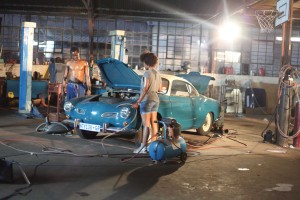
Part of the trick to successful filmmaking collaboration is mutual respect for each other’s talents. In order to co-direct Pocha, Dwyer and McLaughlin established clear authority and defined roles. She had final say on the page, he had final say on the screen. Nevertheless, Dwyer asserted, “Kate and I were always tackling everything together, all the time. How are we going to cover the scene? What are the important elements? How are we going to guide the actors through these things? Those were important discussions we were constantly having together. I think the film is better off because of it.”
Finding a competent crew that can work under the parameters of indie production – tight schedules, small staff and limited budgets – can be a tricky task for any filmmaker. The female directors interviewed were extremely pleased with the hard-work and talent displayed by their below-the-line collaborators. Many hired other women in key positions.
To meet the 16-day schedule, Day Out of Days needed a highly efficient crew. Cassavetes pulled in Denise Milford as cinematographer. Milford had never shot a feature before, but had done a lot of beauty work and knew how to light the actors in a flattering way.
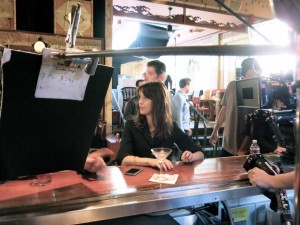
In commenting on production designer Sara Beckum Jamieson, Cassavetes exclaimed, “Talk about making something out of nothing. She and her team gave me everything I wanted.”
Shooting under the brutal schedule of an indie production makes taking care of the actors even more essential. Make-up department head Molly Paddon did her part towards that end, while costume designer Rebecca Gregg not only dressed the cast, but also hid the pregnancy of the lead character in a way that did not reveal her condition.
Cassavetes’ favorite part of the filmmaking process is editing because she gets to shape and create. She worked with editor Michael Mees at his house and felt there was ease to that collaboration. “My crew was like my family,” said Cassavetes. “I love my crew. They mean the world to me. I couldn’t do what I wanted to do without them.” Asked if she would work with this crew again if she had a project starting tomorrow, Cassavetes quickly responded, “Hell, yeah!”
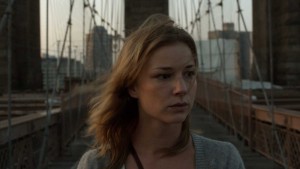
Cohn dealt with The Girl in the Book crew in what she contends is a typically collaborative female manner, “I think somebody might have a better suggestion.” Above all she praised her experienced assistant director Bruce Hall with keeping the production on schedule while shooting at 28 locations in 23 days.
Having worked a lot, Blecher has built up a mutual respect with her regular crew that she assembled for Ayanda. She has worked with her cinematographer Jonathan Kovel on two films. Because the story consists of a film-within-a-film, they delineated the parts of the story with two different looks. The documentary-style interviews had an Instagram look. The main narrative was as colorful as possible to highlight the vibrancy of African culture.
When her regular female editor was unavailable, Nicholas Costaras came on as editor. She was a bit concerned and asked him if he could “cut with your heart,” but within two weeks they clicked and her fears were dispelled. Costaras had to deal with improvisation in the performances, always a bit tricky for editing.

Art director Flo Blauch assembled all the vehicles needed for the story. “One thing that was interesting about the film – and this maybe goes to the female director thing – this was a film about cars and mechanics and garages, which to me was the least interesting part of the film. I’m much more interested in the story about the girl and her relationships.” Blecher revealed. “Probably as a consequence of that, we did not have a car that drove on the entire set. I don’t think there was one car on set that didn’t have to be towed into the shop, which is kind of an extraordinary thing. I think that is something that might not have happened if I were a male director.”
In getting Pocha to the screen, Dwyer and McLaughlin stated, “Much can be achieved with a small dedicated crew.” They give particular credit to Jesse Curl, their gaffer, for getting them through the script’s extensive night scenes in a short amount of time. Bringing continuity to the character looks was hair and makeup designer Haley O’Neil, who worked on the whole production.
Dwyer shot Justin Paul Miller’s first film, so Miller came on to edit Pocha with the express mandate of building the emotional engagement as quickly as possible. Coming out of documentary editing, Tova Goodman took a different approach to the editing, breaking the rules, not worrying about whether the footage was perfect, consistently challenging the filmmakers. The courageous choice was made with protagonist Claudia (Veronica Sixtos) that allowed the character to be bold and less apologetic for her actions
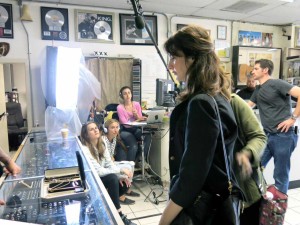
McLaughlin shared, “People like to talk about the likeability factor of female characters, something we were less concerned with. We were much more concerned with telling the story of a strong, adaptable woman who was determined not to be a victim, and less concerned if people were going to like her. We were concerned with treating her as a compelling character who we were not afraid to show making bad choices or doing things that might alienate people.”
It was challenging finding a crew for a micro-budget film in a foreign city, especially Hong Kong where all the features are big budget, and the crew is used to union-scale rates. Fortunately for Ting, It’s Already Tomorrow in Hong Kong producer Sophia Shek was able to pull in some favors and get a package deal. Essential to the run-and-gun nature of shooting on the streets of Hong Kong were camera operators Chi Fai (Mike) Lau and Nathan Wong.
Certain key crew came from the U.S., including cinematographer Josh Silfen, production designer Haley Keim and editor Danielle Wang. The unsung hero of the production turned out to be script supervisor Peter Chan who happened to be on vacation in Hong Kong when he discovered the production on Facebook. Although much of the film relies on “oners,” Chan made sure there was coverage so that editorial had options.
Cassavetes remarked that Day Out Of Days was an important step in her personal growth as a filmmaker. She let go of all the pretenses of what things should be like, and in turn gained expressive freedom. “There’s something nice when people don’t have expectations about you. You go into your bubble and do your thing and you come out with something. I’m happy that this was a relevant movie, a cautionary tale and all of that, but we really just wanted to make a movie.”
And maybe that is the point. These female directors have stories to tell and they want to tell them with the insight and passion they possess as filmmakers. When afforded the opportunity to helm a film, these women, and others, have proven themselves more than capable of holding their own, as is evident by the number of awards they garnered at the Los Angeles Film Festival, listed below:
World Fiction Award
Flocken (Sweden)
Director Beata Gårdeler
Screenwriter Emma Broström
Breathtaking cinematography captures the desolation of a tiny Swedish village when a tight-knit community turns against a 14-year-old girl and her family after she reports being sexually assaulted by a popular classmate.
The World Fiction Jury awarded Special Mention to:
Ayanda and the Mechanic (South Africa)
Director Sara Blecher
Screenwriter Trish Malone
Within a multi-African Johannesburg community, a young hipster-designer saves her deceased father’s prized garage by refurbishing classic cars until family secrets and a corrupt legal system threaten her passionate resolve.
The Documentary Jury awarded a Special Mention for Directing
The Babushkas of Chernobyl
Directors/Producers Holly Morris, Anne Bogart
In the radioactive “dead zone” surrounding Chernobyl’s Reactor No. 4, a defiant community of elderly women cultivates an existence on some of the most toxic land on Earth.
LA Muse Award
Can You Dig This
Director Delila Vallot
In South Central Los Angeles, one of the largest food deserts in the U.S., inspirational stories of new gardeners reveal the beginnings of an urban gardening revolution and the lasting impact of planting seeds for a better life.
Zeitgeist Award (Special Mention for Directing) and Audience Award for Best Fiction Feature Film
Pocha (Manifest Destiny)
Director Michael Dwyer
Co-Director/Writer Kaitlin McLaughlin
A young woman deported to Mexico must choose between reconciling with her estranged father or partnering with a local smuggler to return to the U.S.
Audience Award for Best Documentary Feature Film (Two Films Tied)
I am Thalente
Director Natalie Johns
One of the most promising young skaters in the world, Thalente Biyela, navigates growing up within the demands of professional skateboarding from the skate parks of Durban, South Africa to Venice, Calif.
Be Here Now
Director Lilibet Foster
After landing the lead role in Spartacus: Blood and Sand, Andy Whitfield learns he has non-Hodgkin lymphoma. Armed with resilience, courage and the adoration of his family, he prepares for the battle of his life.
Audience Award for Best Web-Series
The Genderton Project
Anna Martemucci, Victor Quinaz
A modern group of young gay men head to Palm Springs for a gay wedding weekend, when their story is interrupted by the tale of a 1960s’ Pasadena housewife whose life is anything but a piece of cake in this gender-swapped comedy.





